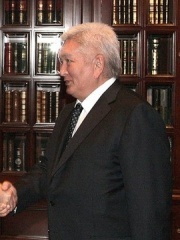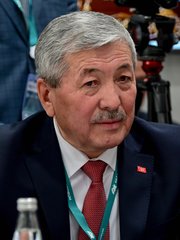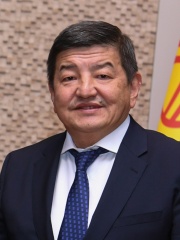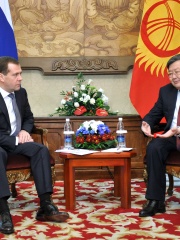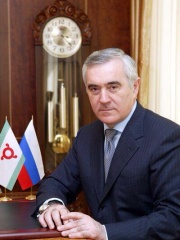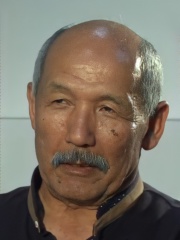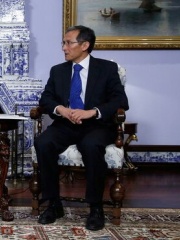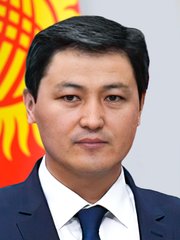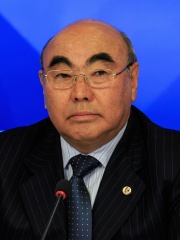
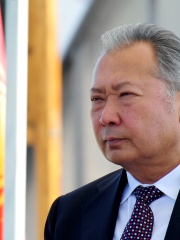
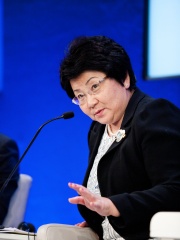
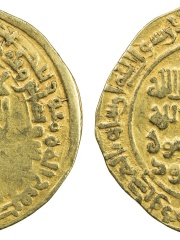
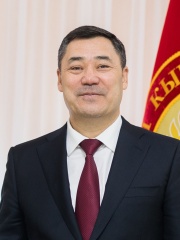
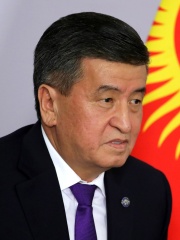
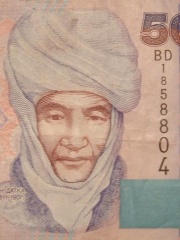
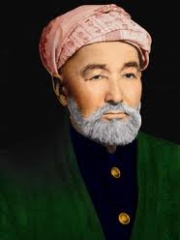
The Most Famous
POLITICIANS from Kyrgyzstan
This page contains a list of the greatest Kirghiz Politicians. The pantheon dataset contains 19,576 Politicians, 27 of which were born in Kyrgyzstan. This makes Kyrgyzstan the birth place of the 96th most number of Politicians behind Luxembourg, and Myanmar (Burma).
Top 10
The following people are considered by Pantheon to be the top 10 most legendary Kirghiz Politicians of all time. This list of famous Kirghiz Politicians is sorted by HPI (Historical Popularity Index), a metric that aggregates information on a biography's online popularity. Visit the rankings page to view the entire list of Kirghiz Politicians.

1. Askar Akayev (b. 1944)
With an HPI of 69.39, Askar Akayev is the most famous Kirghiz Politician. His biography has been translated into 51 different languages on wikipedia.
Askar Akayevich Akayev (Kyrgyz: Аскар Акай уулу Акаев, IPA: [ɑsˈqɑr ɑˌχɑj‿uːˈɫʊ ɑˈχajɪf]; born 10 November 1944) is a Kyrgyz former politician who served as President of Kyrgyzstan from 1990 until being overthrown in the March 2005 Tulip Revolution.

2. Kurmanbek Bakiyev (b. 1949)
With an HPI of 68.58, Kurmanbek Bakiyev is the 2nd most famous Kirghiz Politician. His biography has been translated into 59 different languages.
Kurmanbek Sali uulu Bakiyev (born 1 August 1949) is a Kyrgyzstani politician who served as the second president of Kyrgyzstan from 2005 until his removal from office as a result of the Kyrgyz Revolution of 2010, forcing Bakiyev to flee the country. Bakiyev was the leader of the People's Movement of Kyrgyzstan before his ascendance to the presidency. He received most of his popular support from the south of the country. The Legislative Assembly of Kyrgyzstan of the Supreme Council of Kyrgyzstan appointed him acting president on 25 March 2005, following the ousting, during the Tulip Revolution, of President Askar Akayev. In October 2007, Bakiyev initiated the creation of Ak Jol party, but could not lead it due to his presidency.

3. Roza Otunbayeva (b. 1950)
With an HPI of 67.75, Roza Otunbayeva is the 3rd most famous Kirghiz Politician. Her biography has been translated into 64 different languages.
Roza Isakovna Otunbayeva (born 23 August 1950) is a Kyrgyzstani politician and diplomat who served as the President of Kyrgyzstan from 7 April 2010 until 1 December 2011, becoming the first female Central Asian head of state. She was sworn in on 3 July 2010, after acting as interim leader following the 2010 April Revolution, which led to the ousting of President Kurmanbek Bakiyev. She previously served as Minister of Foreign Affairs and as head of the parliamentary caucus for the Social Democratic Party of Kyrgyzstan. She is also known for the persecution of human rights activist Azimzhan Askarov and the failed policy that led to the clashes of June 2010. Since 2022, Otunbayeva has been serving as United Nations Secretary-General António Guterres's Special Representative for Afghanistan and Head of the United Nations Assistance Mission in Afghanistan (UNAMA).

4. Sabuktigin (942 - 997)
With an HPI of 67.05, Sabuktigin is the 4th most famous Kirghiz Politician. His biography has been translated into 30 different languages.
Abu Mansur Nasir ad-Din wa'd-Dawla Sabuktigin (Persian: ابومنصور ناصرالدین والدوله سبکتگین; c. 940s – August-September 997) was the founder of the Ghaznavid dynasty, and amir of Ghazna from 977 to 997. Sabuktigin was a Turkic slave who was bought by Alp-Tegin, the commander of the royal guard of the Samanid dynasty. Alp-Tegin established himself as the governor of Ghazna in 962, and died a year later in 963. Afterwards, Sabuktigin built his prestige among other slave soldiers in Ghazna until he was elected by them as their ruler in 977. Sabuktigin expanded his rule down to south of present-day Afghanistan and north of Balochistan. Through conflicts with the Hindu Shahi dynasty of Kabul, he invaded Indian lands, opening the gates of India for the future monarchs of his dynasty. As a vassal of the Samanid Empire, he answered Nuh II's call to help regarding Abu Ali Simjuri's rebellion, defeating the latter in several battles during 994 to 996. Towards the end of his life, Sabuktigin arranged an agreement with the Kara-Khanid Khanate, Samanids' rivals, to partition Nuh's realm between themselves. However, before he could realize this agreement, he died on his way to Ghazna on August-September 997. As the founder of the Ghaznavid dynasty, Sabuktigin was later idealized by Ghaznavid historians as a just and forgiving ruler, though these traits may have no basis in reality. He was the image of the "founding monarch" archetype, developed by historians such as Abu'l-Fadl Bayhaqi, who drew a contrast between the humble and just Sabuktigin with his successors. This conclusion was shared by later historians such as Nizam al-Mulk and lived all the way to Babur, the founding monarch of the Mughal Empire, who was influenced by Sabuktigin half a millennium after his death.
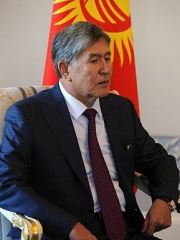
5. Almazbek Atambayev (b. 1956)
With an HPI of 65.57, Almazbek Atambayev is the 5th most famous Kirghiz Politician. His biography has been translated into 69 different languages.
Almazbek Sharshenovich Atambayev (born 17 September 1956) is a Kyrgyzstani politician who served as the fourth president of Kyrgyzstan from 2011 to 2017. He previously served as the 11th prime minister of Kyrgyzstan from 2010 to 2011, and from 2007 to 2007 and Chairman of the Social Democratic Party of Kyrgyzstan (SDPK) from 1999 to 2011. Unlike most elected presidents of the Central Asian countries, Almazbek Atambayev did not try to extend his powers after the term specified by the Constitution and peacefully transferred power, marking the first such precedent in the history of modern Central Asia. Under him, the country passed a constitutional reform that strengthened the role of the parliament, and also introduced a biometric election system, carried out with the help of the European Union.

6. Sadyr Japarov (b. 1968)
With an HPI of 64.17, Sadyr Japarov is the 6th most famous Kirghiz Politician. His biography has been translated into 55 different languages.
Sadyr Nurgojo uulu Japarov (born 6 December 1968) is a Kyrgyz politician who has been serving as the sixth president of Kyrgyzstan since 28 January 2021. He previously served as the 22nd prime minister in the 2020 interim government, following the resignation of President Sooronbay Jeenbekov. Japarov also became acting president of Kyrgyzstan after Jeenbekov's resignation, but resigned himself on 14 November 2020 to run for the 2021 presidential election, in which he was elected to succeed the acting president, Talant Mamytov. Japarov began his political career as a deputy in 2005 after being elected to the Supreme Council and from 2007 served in the presidential administration under Kurmanbek Bakiyev before his overthrow in the 2010 Kyrgyz Revolution. From there, Japarov returned working as a deputy and held popular rallies to overthrow the Kyrgyz government during the attempts of seizing the Bishkek White House and allegedly kidnapping an akim, which led for him to flee Kyrgyzstan for exile in 2013 to avoid prosecution. Japarov returned to Kyrgyzstan in 2017, where he was arrested and imprisoned for 11 years due to his prior illegal political activities. His prison sentence time was cut short after eventually being freed by his supporters during the 2020 Kyrgyz Revolution and leading for his rise to power in Kyrgyzstan. Japarov's presidency is viewed to be authoritarian, as he consolidated power and stifled dissent. Prior to Japarov taking charge, Kyrgyzstan was known for having a relatively open political climate compared to other post-Soviet states of Central Asia. He reintroduced a presidential system via constitutional and government system referendums which increased his executive powers to absolute and reduced the parliament's influence, as well as creating the People's Kurultai which resulted in Kyrgyzstan facing democratic backsliding. Several opposition politicians and activists were detained, independent media outlets have been shut down and journalists arrested, and new laws aimed at suppressing independent media were introduced. Under his presidency, the Kyrgyz government has embarked on a vast public spending spree, much of which is going to companies owned by Japarov through complex networks of proxies.

7. Sooronbay Jeenbekov (b. 1958)
With an HPI of 64.16, Sooronbay Jeenbekov is the 7th most famous Kirghiz Politician. His biography has been translated into 53 different languages.
Sooronbay Sharip uulu Jeenbekov (born 16 November 1958) is a Kyrgyz politician who served as the fifth president of Kyrgyzstan from 2017 until his resignation in 2020, following a week of protests. Prior to that he served as the 18th prime minister of Kyrgyzstan from April 2016 to August 2017. As president, Jeenbekov dealt with issues specifically in foreign policy and corruption in which several juridical reforms were implemented to improve public trust. In spite of that, Kyrgyzstan under Jeenbekov faced a growth of organised crime and government corruption and lack of economic development which was negatively affected upon the COVID-19 pandemic and was accused of downplaying the alleged cases of electoral fraud in the 2020 parliamentary election that resulted in the 2020 Kyrgyz Revolution and his resignation amidst political unrest over the disputed election results. He was succeeded by Sadyr Japarov who would go on to serve as an acting president and prime minister for short period of time before being officially elected in the 2021 presidential elections. Jeenbekov was widely expected to continue the policies of his predecessor, Almazbek Atambayev, the two fell out just months after he took office, resulting in Atambayev's arrest and the decline of his influence in Kyrgyz politics.

8. Kurmanjan Datka (1811 - 1907)
With an HPI of 63.28, Kurmanjan Datka is the 8th most famous Kirghiz Politician. Her biography has been translated into 18 different languages.
Kurmanjan Datka or Datka Kurmanjan Mamatbay kyzy (22 May, 1811 – 1 February 1907), also known as the "Tsaritsa of Alai" (Алайская царица) or the "Queen of the South", was a Kyrgyz politician who acquiesced under duress to the annexation of that region to Russia. She was a female tribal leader and nicknamed the Queen.

9. Elihan Tore (1885 - 1976)
With an HPI of 60.17, Elihan Tore is the 9th most famous Kirghiz Politician. His biography has been translated into 17 different languages.
Elihan Tore Saghuny (21 March 1884 – 28 February 1976) was an Uzbek political and religious leader who served as the president of the Second East Turkestan Republic (1944–1946). He was born in Tokmok, in present-day Kyrgyzstan, and moved to Kashgar, Xinjiang, in 1920. In April 1944, Elihan and eleven other Turkic leaders formed the East Turkistan Liberation Organization in Ghulja (Yining) to end Chinese Nationalist rule and establish an independent East Turkestan. On 11 November 1944, they launched the Ili Rebellion with the support of the Soviet Union.
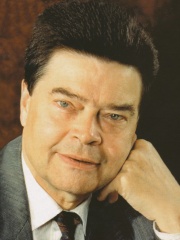
10. Boris Pankin (b. 1931)
With an HPI of 59.82, Boris Pankin is the 10th most famous Kirghiz Politician. His biography has been translated into 20 different languages.
Boris Dmitriyevich Pankin (Russian: Борис Дмитриевич Панкин; born 20 February 1931) is a former Soviet diplomat who served as acting Minister of Foreign Affairs of the USSR for a brief period in 1991.
People
Pantheon has 27 people classified as Kirghiz politicians born between 942 and 1987. Of these 27, 22 (81.48%) of them are still alive today. The most famous living Kirghiz politicians include Askar Akayev, Kurmanbek Bakiyev, and Roza Otunbayeva. The most famous deceased Kirghiz politicians include Sabuktigin, Kurmanjan Datka, and Elihan Tore. As of April 2024, 2 new Kirghiz politicians have been added to Pantheon including Adylbek Kasymaliev, and Ulukbek Maripov.
Living Kirghiz Politicians
Go to all RankingsAskar Akayev
1944 - Present
HPI: 69.39
Kurmanbek Bakiyev
1949 - Present
HPI: 68.58
Roza Otunbayeva
1950 - Present
HPI: 67.75
Almazbek Atambayev
1956 - Present
HPI: 65.57
Sadyr Japarov
1968 - Present
HPI: 64.17
Sooronbay Jeenbekov
1958 - Present
HPI: 64.16
Boris Pankin
1931 - Present
HPI: 59.82
Felix Kulov
1948 - Present
HPI: 58.59
Adylbek Kasymaliev
1960 - Present
HPI: 54.78
Akylbek Japarov
1965 - Present
HPI: 53.56
Zhantoro Satybaldiyev
1956 - Present
HPI: 52.68
Murat Zyazikov
1957 - Present
HPI: 52.63
Deceased Kirghiz Politicians
Go to all RankingsSabuktigin
942 - 997
HPI: 67.05
Kurmanjan Datka
1811 - 1907
HPI: 63.28
Elihan Tore
1885 - 1976
HPI: 60.17
Ishenbai Kadyrbekov
1949 - Present
HPI: 53.78
Djoomart Otorbaev
1955 - Present
HPI: 52.84

